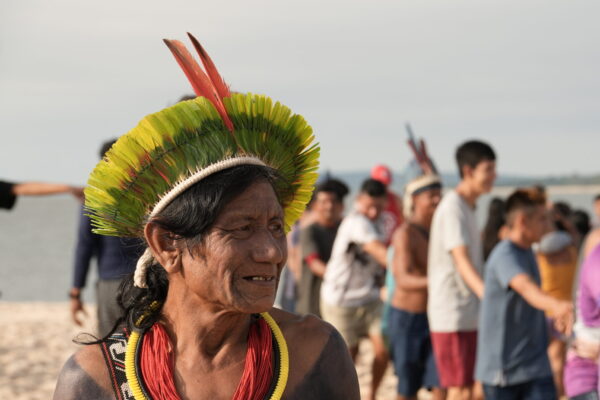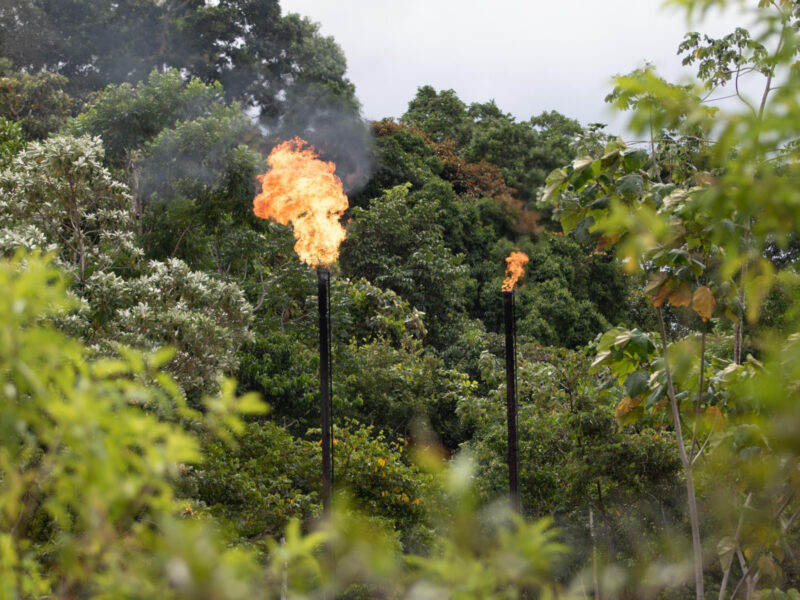As Miguel Guimaraes finishes his speech, the room is silent for a brief moment – until the audience erupts in applause. Guimaraes just made history as the first Indigenous leader to address the plenary session of the Conference of the Parties of the United Nations on Transnational Organized Crime (COP12). In just three minutes, he captured the brutal reality of criminal economies ravaging the Amazon and its peoples:
“Indigenous leaders who protect the Amazon are being assassinated or live under constant threat. Criminal actors pollute our rivers, dispossess our territories, recruit our children, violate our peoples, and even threaten the survival of those in voluntary isolation.”
Guimaraes, vice-president of the Interethnic Association for the Development of the Peruvian Rainforest (AIDESEP), was resolute: while Indigenous communities continue to defend their lands, they need urgent support from both national and international institutions. He called for collective land titling, legal recognition, and public funding for self-protection systems to safeguard Indigenous territories from illicit activities like mining and drug trafficking.
The room, filled with hundreds of diplomats, U.N. officials, and civil society representatives, responded with applause – an unusual and rare gesture at such events.
Earlier that day, Herlín Odicio, a leader of the Kakataibo people of Peru, outlined what Indigenous communities need from the international community: rapid protection measures, access to justice, and investment in sustainable local and regional economic alternatives.
“The Kakataibo have lost six leaders to assassinations in recent years – part of a broader pattern where over 36 Amazonian leaders have been killed in Peru alone,” Odicio said. “Governments fail to prevent violence despite prolonged threats, leaving us vulnerable. I had to leave my territory because of these threats. In the case of the Kakataibo people, even the reserves that protect our brothers in isolation are threatened by illegal airstrips, roads, and laboratories.”
COP12 is one of the most crucial venues to coordinate an international response to the growing impact of organized crime across the Amazon and the world. During their time in Vienna, Guimaraes and Odicio joined global efforts, accompanied by Amazon Watch and the Global Initiative Against Transnational Crime, to demand a protocol on environmental crimes, which would impose binding commitments on nations to protect biodiversity. While this ambitious goal will take time, their voices made it clear: The Amazon is a global priority, and defending it requires urgent action from the international community.”
This violence is deeply personal
To Guimaraes and Odicio, the devastating impacts of expanding transnational criminal economies are deeply personal. Their communities in the Peruvian Amazon have been directly targeted by criminal groups, forcing them to flee and lose their traditional ways of life, such as cultivating organic pineapple and bananas. Now, both of them live in the city, far from their ancestral territories and communities.
Empowered by their deep desire to return home and protect their ancestral territories from these existential threats, Guimaraes and Odicio traveled thousands of miles to participate in a space that has historically little civil society participation. Although Indigenous perspectives are fundamental to the discussion on organized crime, as they are both affected by its impacts and crucial to any solution for protecting the Amazon, so far they were never included in the process. These U.N. conferences are hard to navigate, as discussions are in English, forcing the leaders to rely on interpretation. Opportunities to participate are limited and brief, as diplomats focus mainly on negotiations among themselves.
Having navigated the challenges of the COP skillfully, Guimaraes and Odicio delivered three core messages to world leaders, officials, and civil society groups:
- Criminal economies pose a grave threat to the Amazon, Indigenous rights, and global biodiversity, deepening the climate crisis.
- Indigenous territorial governance, economies, and self-protection measures are crucial to combat organized crime, but require full backing from governments and the international community.
- Indigenous organizations must be active participants in shaping policies to prevent and contain organized crime.
Amazon Watch’s work on “Amazon Crime”
Our groundbreaking report Amazon Underworld revealed that criminal economies now dominate 70 percent of Amazonian municipalities across Bolivia, Brazil, Colombia, Ecuador, Peru, and Venezuela.
Networks of illicit economies, or “Amazon Crime,” have diversified and expanded the territorial control and political power of criminal gangs, posing existential threats to biodiversity, ecological integrity, and Indigenous rights across the Amazon.
Growing criminal economies drive environmental destruction through illegal activities such as logging, mining, and wildlife trafficking. These burgeoning criminal markets coupled with weak or complicit state institutions in the region are of grave concern to Indigenous communities on the front lines of this violence, who warn that criminal groups are taking over local government structures and territorial control. Without coordinated regional and international intervention, these converging forces could push the Amazon past its catastrophic tipping point, accelerating global biodiversity loss and transforming the vital biome into a savanna-like landscape.
As our partners – especially leaders such as Guimaraes, Odicio, and others from the Munduruku, Wampis, and the Federation of Indigenous Organizations of the Napo River in Ecuador – have raised the alarm about the increasingly devastating impact of criminal economies on their territories and communities, Amazon Watch has responded with urgent solidarity. We have expanded our mission to prioritize international advocacy aimed at curbing criminal economies and protecting Indigenous land defenders.
Our emerging strategy is a multi-pronged approach that centers both the immediate needs and long-term visions of our Indigenous partners in the region:
- Emergency support for communities and Earth defenders at risk, including safety measures, legal aid, advocacy, and media outreach.
- Strengthening Indigenous governance and self-determination to protect territories from organized crime and illegal industries.
- Supporting the installation of internet and solar energy in isolated territories, so that Indigenous communities can monitor their territories and denounce deforestation and violence
- Raising awareness through research, advocacy, and campaigns to demand urgent political action at all levels.
As world leaders gather again in Cali, Colombia this week to discuss threats to global biodiversity at COP16, Indigenous Amazonian leaders continue to emphasize that Indigenous self-determination must be at the core of international strategies to curb transnational crime to safeguard global biodiversity and our climate.
“Our peoples are protecting the Amazon for all of us,“ Guimaraes and Odicio declared. “It’s time for the international community to step up.” At Amazon Watch, we will continue this work alongside our Indigenous allies, pushing for long-term strategies that strengthen self-protection, target illegal financial flows, and uphold Indigenous rights. The stakes are high – but the urgency has never been more clear.












